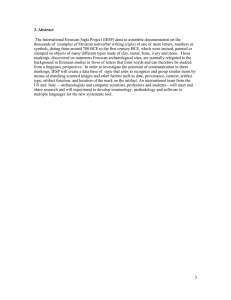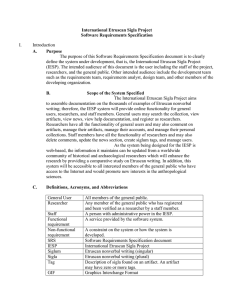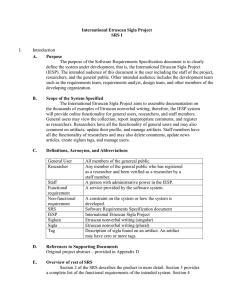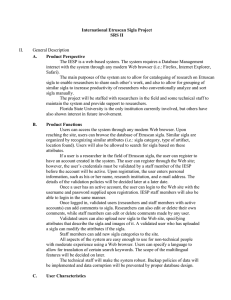International Etruscan Sigla Project SRS II A. Product Perspective
advertisement
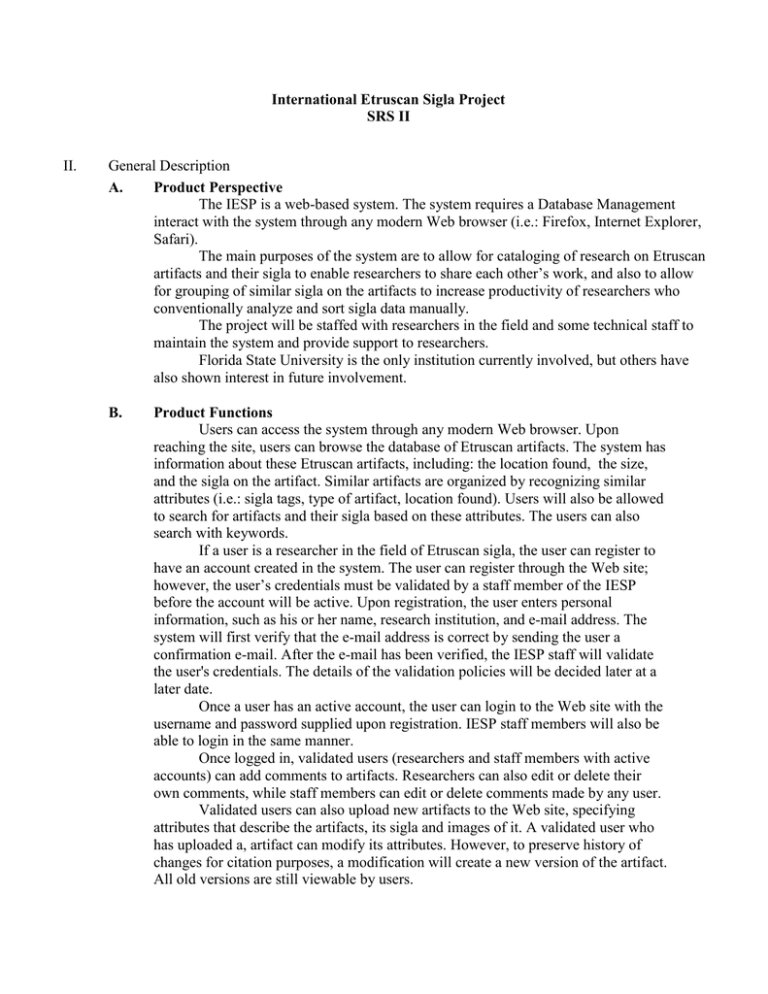
International Etruscan Sigla Project SRS II II. General Description A. Product Perspective The IESP is a web-based system. The system requires a Database Management interact with the system through any modern Web browser (i.e.: Firefox, Internet Explorer, Safari). The main purposes of the system are to allow for cataloging of research on Etruscan artifacts and their sigla to enable researchers to share each other’s work, and also to allow for grouping of similar sigla on the artifacts to increase productivity of researchers who conventionally analyze and sort sigla data manually. The project will be staffed with researchers in the field and some technical staff to maintain the system and provide support to researchers. Florida State University is the only institution currently involved, but others have also shown interest in future involvement. B. Product Functions Users can access the system through any modern Web browser. Upon reaching the site, users can browse the database of Etruscan artifacts. The system has information about these Etruscan artifacts, including: the location found, the size, and the sigla on the artifact. Similar artifacts are organized by recognizing similar attributes (i.e.: sigla tags, type of artifact, location found). Users will also be allowed to search for artifacts and their sigla based on these attributes. The users can also search with keywords. If a user is a researcher in the field of Etruscan sigla, the user can register to have an account created in the system. The user can register through the Web site; however, the user’s credentials must be validated by a staff member of the IESP before the account will be active. Upon registration, the user enters personal information, such as his or her name, research institution, and e-mail address. The system will first verify that the e-mail address is correct by sending the user a confirmation e-mail. After the e-mail has been verified, the IESP staff will validate the user's credentials. The details of the validation policies will be decided later at a later date. Once a user has an active account, the user can login to the Web site with the username and password supplied upon registration. IESP staff members will also be able to login in the same manner. Once logged in, validated users (researchers and staff members with active accounts) can add comments to artifacts. Researchers can also edit or delete their own comments, while staff members can edit or delete comments made by any user. Validated users can also upload new artifacts to the Web site, specifying attributes that describe the artifacts, its sigla and images of it. A validated user who has uploaded a, artifact can modify its attributes. However, to preserve history of changes for citation purposes, a modification will create a new version of the artifact. All old versions are still viewable by users. Validated users may also create personal collections of artifacts. A personal collection will be a logical group of artifacts related to a particular study done by a researcher. Staff members can add new sigla tags to the system's database. A sigla tag is a string that describes a particular type of siglum. Staff members can also perform various tasks using the system. They can manager user accounts, by approving or revoking a researchers privileges, or edit a researcher's profile. Staff members can also add news articles to the front page. All aspects of the system are easy enough to use for non-technical people with moderate experience using a Web browser. Users can specify a language to allow for translation of certain search keywords. The scope of the multilingual features will be decided on later. The technical staff will make the system robust. Backup policies of data will be implemented and data corruption will be prevented by proper database design. C. User Characteristics The three main groups of users are the general public, validated researchers, and IESP staff members. The general public can search and browse the collection of artifacts. The general public do not log into the Web site. These users are assumed to have very little technical training. Their educational background and location is unknown. Validated researchers are those who have registered and whose credentials have been validated by IESP staff members. Researchers are also assumed to have little technical training. Their education is assumed to be on the college-level, anywhere between undergraduate and post-doctoral. Researchers will be able to log into the Web site after validation. IESP staff members are divided into two groups – IESP researchers and IESP technical staff. IESP researchers are assumed to have the same level of training as validated researchers, while IESP technical staff members are assumed to have much more technical knowledge. D. General Constraints The system provides web access for all user functions, with the exception that IESP technical staff may have to access certain parts of the system through other means for hardware of software maintenance. The user interface will be intuitive enough for the untrained public to navigate. The system will be robust to allow for persistence storage of researcher information and artifact data. The system will be reliable enough to allow for use by the general public and researchers at their convenience. E. Assumptions The system is assumed to run on free open-source configuration – possibly a LAMP (Linux-Apache-MySQL-PHP/PERL) configuration.
